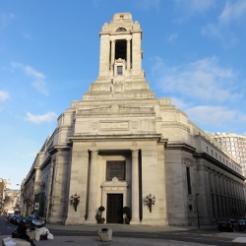Make sure someone is actually in charge of actioning those action points, advises Robert Ashton.
I might get shot for saying this, but I was a freemason for around 15 years. I joined very young, largely because my late father had been a member. He died, I collected all the badges and then it all seemed to become something of a chore so I left. Yes all the dressing up can seem silly, but there’s no doubt that for many blokes, it’s a very positive influence on their lives. It teaches you to be public-spirited and you have lots of opportunity to become a confident public speaker.
But as I sit here reflecting on yet another NHS conundrum, I am reminded of my visits to London’s Freemasons’ Hall (pictured). You see many Masonic Lodges meet quarterly and so do not have a permanent base of their own. The congregate in one of the pubs on Great Queen Street then pop over the road, get dressed up and conduct their business.
The Lodge room will often be the same one every time. It will be set out with that particular Lodge’s bits and bobs and so appear to be exactly the same as it was when everyone left the room three months ago. But the sense of permanence is an illusion because after the chaps toddle off for their dinner, all their stuff is cleared away and stored until the next visit.
So when I asked how NHS and voluntary sector providers of palliative care connect and co-ordinate their work, I am told there’s a group set up to do just that. This is of course encouraging news, because of all aspects of health care, it really is important to get end-of-life care right. You don’t want to be on a waiting list for anything when you are rapidly running out of time.
But my understanding is that while most of these NHS-led groups meet regularly, there’s nobody paid to do stuff between each meeting. I’d like to see someone appointed to act as secretariat to these groups. Someone whose job it is to explore, research, find and present innovative opportunities – and then be accountable for the actions agreed actually happening after the meeting.
You see, as with those Masonic events, when any group of very busy men gather in a familiar room and inevitably occupy the seat they sat in last time, a false sense of continuum is created. Debate, decisions and documents abound, but real change, without real people in post to drive it, simply won’t happen.
Yes there’s an argument that says this would cost money, but equally once you start to look, there’s real evidence that creating momentum like this can deliver massive returns, both in terms of budget and patient experience. So please, if you sit on one of these sector committees, whatever the sector, ask what’s going to happen tomorrow to deliver the change you’re all trying to achieve. Someone needs to do much more than switch off the light!









